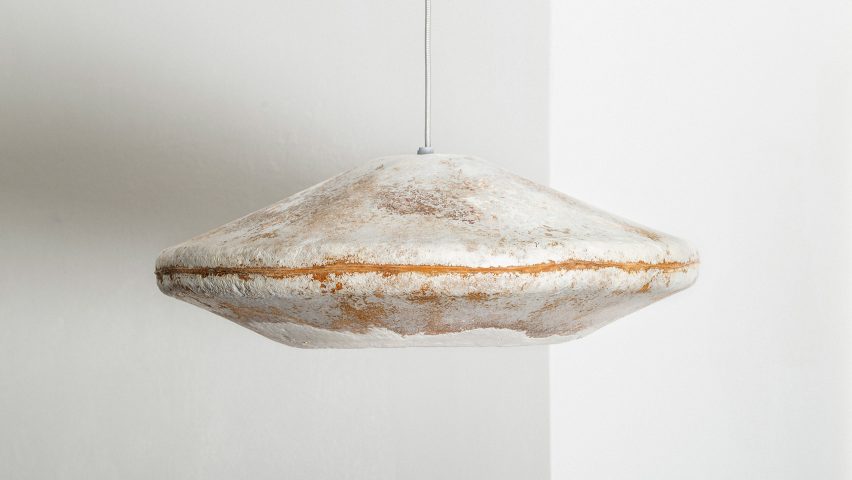Tallinn-based materials company Myceen has released a series of pendant lampshades called B Wise made from mycelium, which were shown at Dutch Design Week.
Each of the bell-shaped pendant lamps were made from mycelium – the vegetative part of a fungus – while more conventional plywood and aluminium form the frame.
To create the shades, which are 60 centimetres wide, waste organic material from the timber and agricultural industry including sawdust and straw was mixed with mycelium in Myceen's Tallinn workshop.
Mycelium is the filament structure that fungi use to grow, much like the roots of a plant. The mixture was then poured into the lampshade mould and left to grow under controlled temperature and humidity conditions.
Here, the fungus starts to feed on the waste and expand to fit the shape of the lampshade mould. As mycelium acts as a natural binding component, no glue or additives were needed.
Once filled, the material is removed from the mould and dehydrated to prevent it from expanding further. According to Karro, the entire process takes around five weeks from start to finish.
"Inoculated material goes into the mould and after a few days, the material is strong enough to hold itself together," Myceen cofounder Siim Karro told Dezeen.
"The fungi recognise its fellow specie companion and form a strong connection without any glue or artificial binders and the growth of the fungi is stopped completely by drying the material," Karro added.
The rest of the shade is made from a plywood and aluminium frame and comes with a ceramic socket and traditional lighting cable. It is designed to resemble a floating mushroom and weighs just three kilograms.
"The lamp feels soft by touch and it's lighter than one could think, weighing around three kilograms," Karro said. "The surface could vary from harder brownish to soft and velvety white skin.
Mycelium has been used in to create various products recently, including a bicycle helmet and a carbon-negative candle packaging.
The material has is becoming popular among fashion brands, with companies such as Stella McCartney, Adidas and Hermès investing in the biomaterial.
Thanks to its properties, Karro believes that mycelium could replace synthetic materials in a number of interior products and furnishings. Myceen also crafts acoustic panels and plinths from the material.
"Mycelium's growth is exponential making it an intrinsic part of sustainable production since it's basically infinitely reproducible."
Other products on show at Dutch Design Week include a soap packaging made from waste artichoke leaves and peapods by industrial design student Alara Ertenü and an oversized magnifying glass that focuses the sun's heat to melt metal more sustainably by Design Academy Eindhoven graduate Jelle Seegers.
The photography is by Kristjan Mõru.
B Wise was on show from 22 to 30 October as part of Dutch Design Week 2022. See Dezeen Events Guide for an up-to-date list of architecture and design events taking place around the world.

